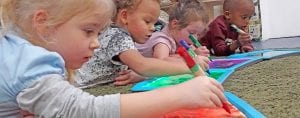What is EYFS?
WHAT IS THE EYFS?
Every child deserves the best possible start in life and the support that enables them to fulfil their potential. Children develop quickly in the early years and a child’s experiences between birth and age five have a major impact on their future life chances. A secure, safe and happy childhood is important in its own right. Good parenting and high quality early learning together provide the foundation children need to make the most of their abilities and talents as they grow up. EYFS sets the standards for learning, growth, development, and care of children from birth to five years old.
Overarching Principles of the EYFS
Four guiding principles should shape practice in early years settings.
- Every child is a unique child, who is constantly learning and can be resilient, capable, confident and self-assured;
- Children learn to be strong and independent through positive relationships;
- Children learn and develop well in enabling environments, in which their experiences respond to their individual needs and there is a strong partnership between practitioners and parents and/or carers.
- Children develop and learn in different ways and at different rates.
The framework covers the education and care of all children in early years provision, including children with special educational needs and disabilities
The Seven Areas of Learning and Development:
There are seven areas of learning and development that must shape educational programmes in early years settings. All areas of learning and development are important and inter-connected. Three areas are particularly crucial for igniting children’s curiosity and enthusiasm for learning, and for building their capacity to learn, form relationships and thrive.
- Communication and Language development involves giving children opportunities to experience a rich language environment; to develop their confidence and skills in expressing themselves, and to speak and listen in a range of situations.
- Physical Development involves providing opportunities for young children to be active and interactive; and to develop their co-ordination, control, and movement. Children must also be helped to understand the importance of physical activity and to make healthy choices in relation to food.
- Personal, Social and Emotional Development involves helping children to develop a positive sense of themselves, and others; to form positive relationships and develop respect for others; to develop social skills and learn how to manage their feelings; to understand appropriate behaviour in groups, and to have confidence in their own abilities.
Providers must also support children in four specific areas, through which the three prime areas are strengthened and applied.
- Literacy involves encouraging children to link sounds and letters and to begin to read and write. Children must be given access to a wide range of reading materials including books, poems, and other written materials to ignite their interest.
- Mathematics involves providing children with opportunities to develop and improve their skills in counting, understanding and using numbers, calculating simple addition and subtraction problems; and to describe shapes, spaces, and measures.
- Understanding The World involves guiding children to make sense of their physical world and their community through opportunities to explore, observe and find out about people, places, technology, and the environment
- Expressive Arts and Design involves enabling children to explore and play with a wide range of media and materials, as well as providing opportunities and encouragement for sharing their thoughts, ideas and feelings through a variety of activities in art, music, movement, dance, role-play, and design and technology.

